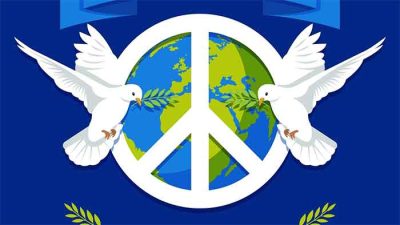Global Research, October 12, 2023
Pressenza 11 October 2023

All Global Research articles can be read in 51 languages by activating the Translate Website button below the author’s name.
To receive Global Research’s Daily Newsletter (selected articles), click here.
Click the share button above to email/forward this article to your friends and colleagues. Follow us on Instagram and Twitter and subscribe to our Telegram Channel. Feel free to repost and share widely Global Research articles.
***
The Brandenburg Gate and the White House are laser-painted in Israeli blue-and-white colours. They used to harbour the Ukrainian blue-and-yellow colours. In both cases, Western governments pledge unlimited support and declare the recent attacks on Israel, as earlier on Ukraine, allegedly unprovoked and evil. Déjà vu.
But there is more in common than sanctimonious self-righteousness. In both cases, there is an adamant refusal to look into the obvious causes of violence. In the case of Israel, this refusal is particularly appalling. For 75 years, Israel dispossessed, exiled, imprisoned, and tortured Palestinians who never knew a day of freedom. As the Israeli journalist Gideon Levy sarcastically put it:
“We’ll fire at innocent people, take out people’s eyes and smash their faces, expel, confiscate, rob, grab people from their beds, carry out ethnic cleansing and of course continue with the unbelievable siege of the Gaza Strip, and everything will be all right.”
Indeed, most Israelis are accustomed to living in denial. They party and enjoy themselves while a few minutes’ drive away armed Zionist settlers set Palestinian villages on fire, attack olive growers, and beat up anyone daring to defend them. This indifference and oblivion turned to tragedy when a music festival was organized on the border with Gaza, where millions of Palestinians endured a brutal siege imposed by Israel and supported by Egypt. Many Israeli ravers ended up killed in the recent attack from Gaza. Israeli civilians who had felt safely sheltered in their private lives were meted a dreadful reminder of the decades-long violence experienced by the Palestinians living under Israeli siege and control. Israelis found themselves in the hell Palestinians live in every day.
It was also a reminder that Israel since its very beginning has been the most dangerous place for Jews. Built on systemic violence against the local population, Israel has relied on naked force to keep that population under control. No wonder, Palestinians try to resist, and this largely desperate resistance targets every Israeli Jew. Moreover, the dangerous conflation of Zionism with Judaism threatens the safety of Jews around the world.
The Israeli government reacted to the recent attack from Gaza with vengeful anger. It unleashed its entire arsenal against Gaza causing death and destruction to Palestinian civilians. Israeli politicians and generals declare that they are fighting against “animals” and “Nazis”. In a remake of the siege of Leningrad, Israel cut all supplies of food and energy to Gaza while bombing its infrastructure. Many of those surviving the bombardment are likely to starve or die of disease caused by the lack of water. Another man-made humanitarian catastrophe descends upon the long-suffering Palestinians.
All this was preventable. Innumerable United Nations resolutions called upon Israel to allow refugees to return to their homes, to allow them to build their own state. Yet, imbued with the colonialist’s sense of superiority and entitlement, Israeli leaders undermined those prospects with unrelenting dispossession of the Palestinians.
This impunity stems from Western, particularly American support. There are geopolitical reasons to keep Israel armed and intransigent. Israel has become an ally, a warehouse for American weapons and an “unsinkable aircraft carrier” in the middle of the Arab world. It helped Washington keep control of much of West Asia.
Similarly, the desire to encircle and weaken Russia explains the U.S. grooming of Ukraine ever since Yeltsin handed its independence over thirty years ago. Twice, in 2004 and 2014 it fomented coups installing politicians bent on destroying traditional economic, cultural and political links with Russia. When Russia finally awoke from its slumber and proposed negotiations of the security arrangements in Europe, Washington, blinded by its sense of omnipotence, disdained the proposal. This is what incited the war in Ukraine. Just as the recent attack from Gaza, the Ukraine war was not unprovoked. Both wars advance American interests but require no American boots on the ground.
In both cases, there is a road to peace. It lies in the recognition of the legitimacy of concerns of the Other. Exact configurations of peace can be hammered out in negotiations. But for this to happen, both Israel and the collective West must abandon hubris and belief in its exceptionality. All colonial powers, be it Britain, France, Netherlands, or Portugal, finally gave up. But first, they violently resisted decolonization and caused unspeakable violence and starvation to keep their colonies. When will Israel see the light, recognize their humanity, and find a reasonable accommodation with the Palestinians? Or will it opt to kill, starve, and expel the survivors far away from their native land as some Zionists have advocated for decades?
*
Note to readers: Please click the share button above. Follow us on Instagram and Twitter and subscribe to our Telegram Channel. Feel free to repost and share widely Global Research articles.
Yakov M. Rabkin is Professor Emeritus of History at the Université of Montréal. His publications include over 300 articles and a few books: Science between Superpowers, A Threat from Within: a Century of Jewish Opposition to Zionism, What is Modern Israel?, Demodernization: A Future in the Past and Judaïsme, islam et modernité. He did consulting work for, inter alia, OECD, NATO, UNESCO and the World Bank. E-mail: yakov.rabkin@umontreal.ca. Website: www.yakovrabkin.ca
Featured image is from Pressenza
No hay comentarios:
Publicar un comentario